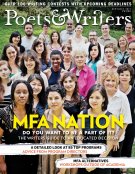Poet Hilda Raz has a firm grasp on what it takes to run a book series. As president of the Association of Writers & Writing Programs (AWP) board in the late eighties, she oversaw the AWP Award Series. She has also been a judge for the National Poetry Series and is the founding director of the University of Nebraska Press’s annual Prairie Schooner Book Prize Series. Last winter, after more than two decades living and teaching in Nebraska, Raz retired to Placitas, New Mexico, where she was recruited as a consultant to help revamp the Mary Burritt Christiansen Poetry Series at the University of New Mexico Press (UNMP). The series, which has published twenty-five books, revised its mission with the help of Raz to focus on putting out poetry that “gives voice to the realities of living, working, and experiencing the West as a place and a metaphor.” Now, Raz has stepped up as the series editor in order to help expand its catalogue and reach. Newly settled into her position, Raz spoke about her hopes for the series.

How did you come to step into the series editor position?
Soon after I’d retired in 2010 and moved to New Mexico, the UNMP called to ask if I’d serve as a consultant to the series, an endowed program undergoing radical revision at the press. A couple of weeks after we’d worked out a mission statement, the press asked me to serve as the new series editor and to publish four books each year. After some negotiation, I said yes. We expect to find new poets and publish established ones to balance their sense of the West with excellent poetic voice and craft. Because the series is endowed, we can look for both dazzling and sometimes-risky manuscripts.
Do you have a particular affinity for the West?
I grew up in Rochester, New York, and I went to school in Boston. But for decades I lived and worked in Nebraska, so my poems are “of the West”—the West as frontier, a challenging and sometimes fearful space to be explored with respect and urgency. A line from T. S. Eliot’s The Waste Land comes to mind: “Come in under the shadow of this red rock.” I’d been on a trip through the desert of New Mexico as a child and that line stayed with me—recalling the bliss of shadow in extreme heat. Something about desert landscapes appealed to me even then. I’m very glad to be living here now.
So is the interpretation of what is “West” necessarily open?
UNMP defines West as “west of the Mississippi” in order to keep the definition very broad. We can best serve writers by publishing poetry that addresses and redefines the notion of the West as it is shaped by each artist’s imperatives. One idea of the West suggests almost infinite space. But then I think of borders, boundaries—and isn’t one of the purposes of art to describe boundaries and then to broach them? Another familiar idea of the West relates to death, for example, and to turn the metaphor, there’s the notion of the eastern city as corrupting and western nature as healing—think of the work of Edward Abbey, for example—I could go on and on.
In my prior work I’ve asked myself, as well as the readers of the journal I edited, Prairie Schooner, to consider matters of the body—the body politic, the body of the family, the human body, and the body of the world. With this series, I’m looking to other poets and writers to challenge and extend our thinking about and responses to the West. But my job as series editor is not to define—in any way—but rather to recognize brilliant redefinitions or explorations of traditional notions. We hope for many voices and perspectives and look forward to publishing an innovative series.
Catherine Richardson is Poets & Writers Magazine’s Diana and Simon Raab Editorial Fellow.








